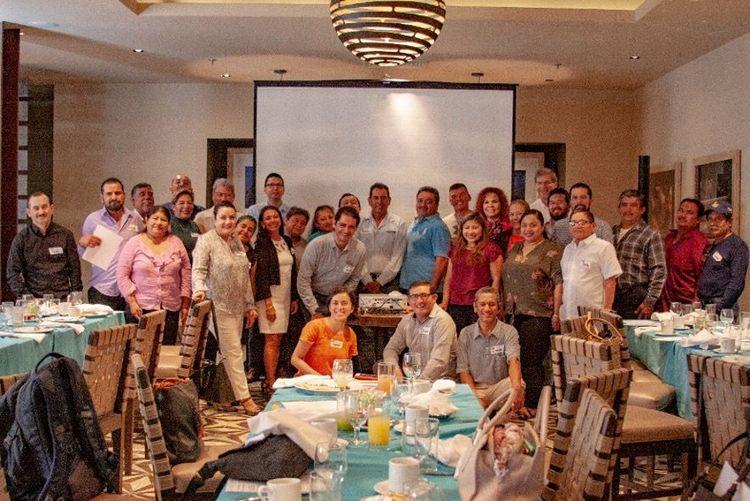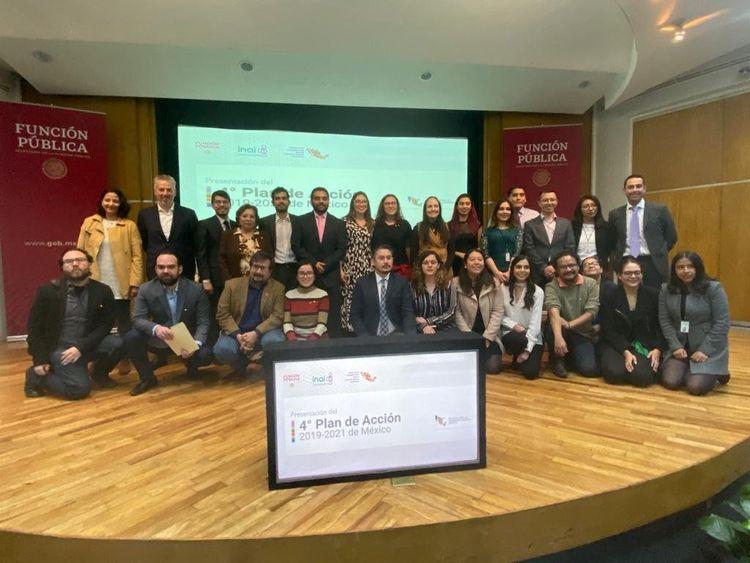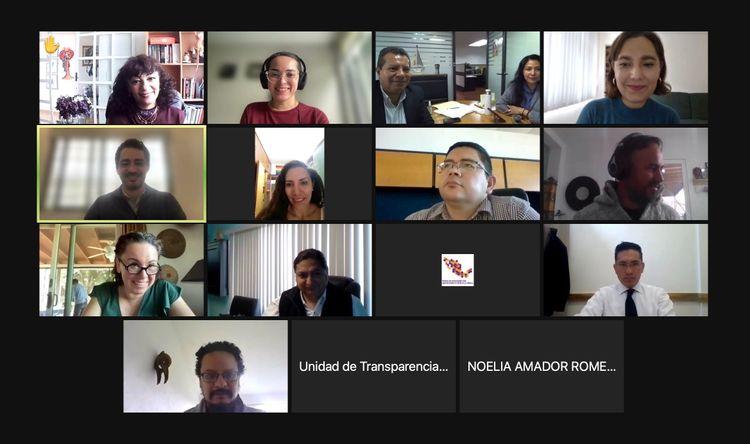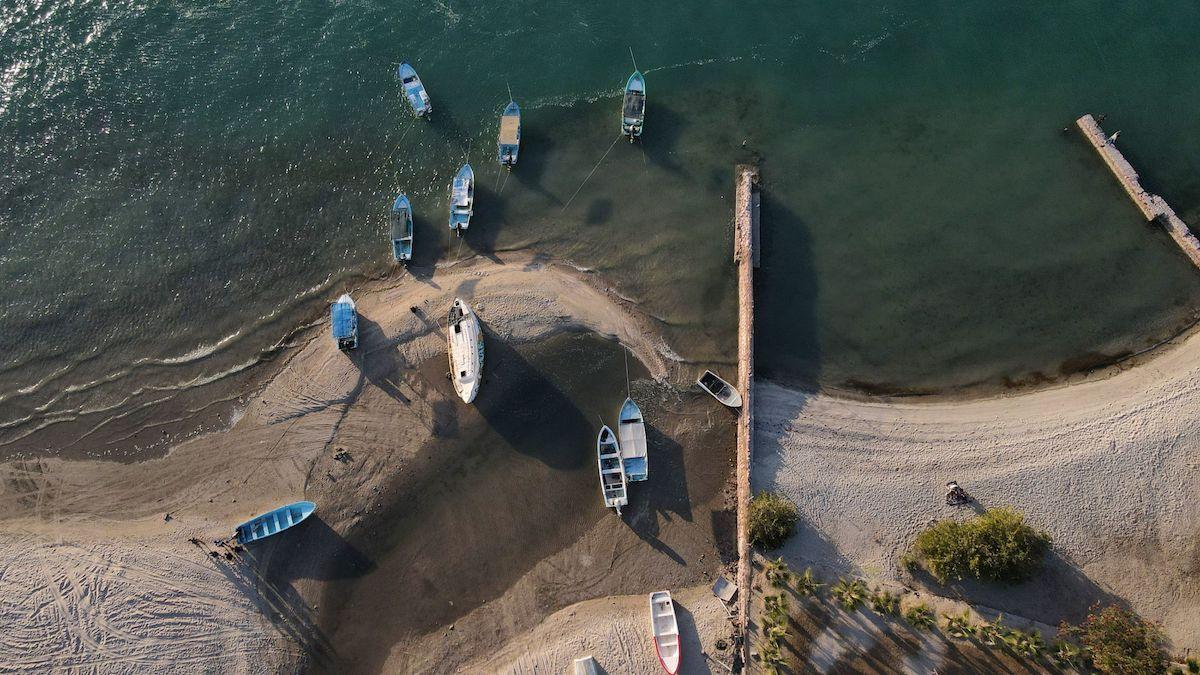Background
The Fisheries Sector Transparency Monitoring Group (GMTP) is a space for collaboration between government and civil society to improve quality and access to public information on the management of fisheries resources. Unlike other participatory spaces such as fisheries councils or advisory committees where issues of management, regulations, trade and even the governance of fishing activity are discussed, the GMTP only promotes the publication of data and fishery information of public interest 1.
It stems from the concern expressed by various civil society actors about the opacity and lack of information on how fishing is managed in Mexico.

Workshop held with small-scale producers and CSOs in Mérida to identify information needs/February 2020.
Who is being granted fishing permits and based on what criteria? How many fishing inspectors are there and what have been their actions and results? What about citizen complaints of illegal fishing? How is the state of fisheries determined and how often is this information updated?
There are information concerns such as these that are recurrent in society and even in government sectors that do not manage information, and that require such information to make or promote better fisheries management decisions.
This need was taken up by the Open Government Alliance (AGA) in Mexico, when it integrated into the Fourth Plan of Action 2019 - 2021 the commitment “Strengthening transparency in the management of forests, water and fisheries”.

Presentation of the Fourth Plan of Action of the Open Government Alliance/December 10, 2019.
Within the framework of this initiative, the foundations were laid for the operation and operation of three transparency monitoring groups: water, forests and fisheries. In particular, the GMTP was installed on October 22, 2021.

Installation of the Fisheries Sector Transparency Monitoring Group/December 10, 2019.
The objective of the Fisheries Sector Transparency Monitoring Group is to provide timely, complete and easily accessible information on the management of fishery resources, contributing to comprehensive governance of fisheries resources.
The AGA's Fourth Action Plan formally ended on August 31, 2022, but the GMTP is a mechanism that transcends this commitment, since it aims to be a permanent space for dialogue between government and society to improve the transparency of fisheries information.
Almost a year after its installation, here we tell you why it is important to continue promoting this group, as well as the advances we have achieved and the expectations that exist for this space in the voice of some of its members.
Advances of the Fisheries Sector Transparency Monitoring Group
Since its installation, it has been promoted to make information and databases on the management of the fishing sector transparent. The first action of the GTMP was to advance the implementation of the recommendations of the 2021 Natural Resources Transparency Index, as well as to identify new issues of public interest by non-governmental members.
As a result, a Work Plan for 2022 was co-created that includes 12 agreements. So far, 8 have been managed in their entirety and work is still under way on the publication of the remaining ones. One of the most notable advances is the publication of arrival notification information, from 2018 to March 2022, since these databases are key to estimating fish and aquaculture production by type of catch or species, and can be the starting point for advancing a traceability policy.
The Transparency Monitoring Group for the Fisheries Sector is useful and relevant.
The GMTP is still a young space, but highly valued by those who until now make up it. Stephen Martínez, director of the Center for Coastal Research and Development (CIDECO), commented that this group is very relevant since there are many issues that need to be made transparent to promote sustainable fisheries.
He points out that one of the most important issues is knowing how fishing permits are granted. “The National Fisheries Charter should be the mechanism for planning the granting of new permits or existing permits, but there is an open secret that there are permits that have been granted by political arrangements, or permits that have been issued in areas where there is no biomass for them to exist.”
He added that one current issue is that of illegal and unreported fishing: “The lower house of the United States is asking for an end to marketing with Mexico as a sanction for vaquita marina, and this is for all of Mexico, not just for the Gulf.” He points out that behind this there is a big problem of inspection and surveillance that must be made transparent. “There are actions but they are not known. What happened to the detainees? How many people got in the boat because of those actions? The legal department of CIDECO has started to investigate but we see that the arrest was poorly done, the follow-up of the investigation followed a bad process, among other irregularities. So, the fact that this can be made transparent is very important.”
Finally, he comments that it would be very valuable to know, from a results-based budgeting perspective, which programs have existed and what their results have been. “On the subject of Bienesca, it is important to know how much has been spent on this support and what the result derived from this effort has been, because for example, if I invest two million in a processing plant I can help several fishermen to increase their income fivefold. So better give them an ice plant than their 7,000 pesos.”
Having this type of information, he concludes, is a start to begin to attack this type of problem.
Minerva Alonso, director of CedePesca, thinks in a similar way, and who recently also requested her integration into the GMTP. She believes that “only with the union of visions can we promote better public policy”. He explains that the Monitoring Group provides a better understanding of the problems for both authorities and other members. “When specific cases such as the problem of octopus overexploitation that I mentioned the other day are exposed, this allows Conapesca to analyze them under the scrutiny of a national policy and to let others know what is happening in other parts of the country.”
He adds that information is the basis for solving these processes. “Information is power. This information is useful not only for those of us who participate in the Group but for others who can make important use of it.” She hopes that more information will be uploaded through the Monitoring Group, but also that it will be given in an expeditious manner: “Especially illegal fishing is a cross-cutting problem that affects the entire sector, and the only way to deal with it effectively is to have expeditious information. The fresher the information, the more likely we are to use it. The more time passes, the easier it is to clean, change, make up or prescribe. If someone is committing an illegal act now, and the information comes to me in six months, that resource (subject to illegality) may not even exist anymore.”
In short, having tools such as the GMTP is not only useful and relevant, it is essential to be able to promote, through transparency, the construction of a better fisheries policy.
Continuing to strengthen transparency depends on all people.
Thanks to the work of organizations and responsible authorities, today there is greater openness of information and a participatory space to continuously promote transparency. However, the task does not end here. The next step is to make use of this information to, together, address current problems and challenges.
In this regard, one of the great challenges of GMTP in the future is to publicize information that is already public and to promote its use, as well as to continue to unite the efforts of producers, researchers and organizations with a commitment to transparency. The future of this Group depends on an active and participatory civil society, as well as on the political will of the government to continue to promote transparency.
If you identify with any of these groups, we invite you to join. The call is open permanently and you can check the requirements and the integration process at the following link.



Comentarios (0)